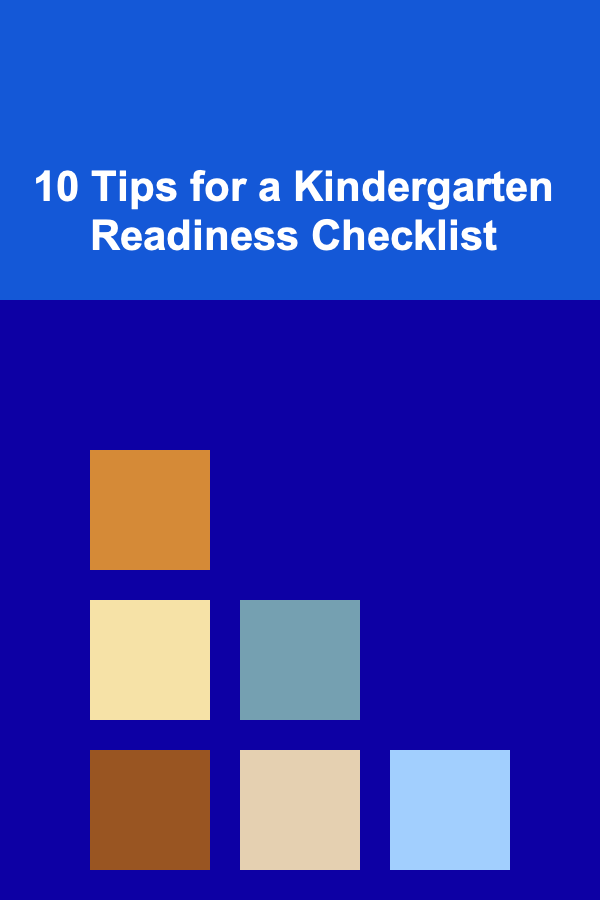
10 Tips for a Kindergarten Readiness Checklist
ebook include PDF & Audio bundle (Micro Guide)
$12.99$8.99
Limited Time Offer! Order within the next:

Starting kindergarten is a significant milestone for both children and parents. It marks the beginning of formal education, and it can often be an exciting yet nerve-wracking experience. As parents, guardians, or caregivers, ensuring that a child is prepared for the demands of kindergarten is essential for a smooth transition. One of the best ways to ease this transition is through a kindergarten readiness checklist. This checklist can guide you through essential areas of development that will support your child's growth, both academically and socially.
In this article, we'll explore ten critical tips to include in a kindergarten readiness checklist. These tips will help ensure that your child is well-prepared to tackle the challenges and excitement that come with starting school.
Develop Basic Social Skills
Why It Matters:
Kindergarten is a social environment where children interact with their peers and teachers. Having the ability to communicate and cooperate with others is vital for a successful start. Social skills like sharing, taking turns, and listening to instructions are foundational for a child's early education.
Tips for Development:
- Encourage Playdates: Arrange regular playdates with peers to give your child opportunities to practice sharing and communicating with others in a non-competitive setting.
- Teach Basic Manners: Teach your child simple manners such as saying "please" and "thank you" and understanding when and how to interrupt.
- Model Positive Interactions: Demonstrate appropriate social behavior by interacting kindly with others in front of your child.
What to Look For:
- Your child should be able to greet others politely, follow simple directions, and express emotions appropriately.
- Your child should be comfortable with basic group activities, such as sitting with others or participating in a circle time activity.
Develop Basic Motor Skills
Why It Matters:
Children need both fine and gross motor skills to thrive in kindergarten. Gross motor skills involve the larger muscles of the body, such as running and jumping, while fine motor skills involve the smaller muscles needed for tasks like writing or using scissors.
Tips for Development:
- Fine Motor Skills: Encourage activities such as coloring, drawing, cutting with child-safe scissors, and playing with building blocks to improve hand-eye coordination.
- Gross Motor Skills: Encourage outdoor play such as running, jumping, climbing, or playing catch to develop balance and coordination.
- Use Age-Appropriate Tools: Ensure that your child has access to tools that are appropriate for their age, like chunky pencils, crayons, and scissors with safety features.
What to Look For:
- Your child should be able to hold a pencil or crayon with a proper grip, use scissors to cut simple shapes, and run, jump, and hop with coordination.
Teach Basic Hygiene and Self-Care Skills
Why It Matters:
Kindergarten requires children to take care of their own basic needs during the day, including eating, toileting, and maintaining personal hygiene. Teaching these skills ahead of time will help your child feel more independent and confident in a school setting.
Tips for Development:
- Handwashing: Teach your child how to wash their hands thoroughly with soap and water, especially before meals and after using the restroom.
- Self-Dressing: Encourage your child to practice dressing and undressing by themselves, including putting on shoes, buttons, and zippers.
- Toileting: Make sure your child is fully potty trained and can use the restroom independently.
What to Look For:
- Your child should be able to manage basic hygiene tasks like washing hands and wiping after using the toilet.
- Your child should be able to dress and undress with minimal assistance.
Foster Early Literacy Skills
Why It Matters:
Reading and writing are fundamental skills for success in kindergarten and beyond. Being able to recognize letters, understand sounds, and begin writing their name will give your child a head start in literacy development.
Tips for Development:
- Letter Recognition: Practice identifying and naming letters of the alphabet in both uppercase and lowercase forms.
- Phonemic Awareness: Play games that help your child recognize and manipulate the sounds of language, such as rhyming or identifying the first sounds of words.
- Reading Together: Read with your child every day. Choose age-appropriate books and encourage your child to engage with the story by asking questions about the pictures and plot.
- Name Writing: Help your child learn to write their first name. Focus on using uppercase for the first letter and lowercase for the rest.
What to Look For:
- Your child should be able to recognize most letters and begin to understand that words are made up of sounds.
- Your child should show an interest in books and can follow a story with some level of comprehension.
Encourage Early Math Skills
Why It Matters:
Mathematical concepts like counting, recognizing numbers, and understanding shapes are foundational for kindergarten math. These skills will help your child feel confident as they start learning more complex math concepts.
Tips for Development:
- Counting: Practice counting objects, such as toys or snacks, and counting aloud together.
- Number Recognition: Help your child recognize and write numbers from 1 to 10.
- Shapes and Colors: Teach your child to recognize basic shapes (circle, square, triangle) and common colors.
- Simple Patterns: Introduce simple patterns like AB, ABB, and AAB and encourage your child to recognize and complete them.
What to Look For:
- Your child should be able to count to at least 10 and recognize numbers.
- Your child should be able to identify basic shapes and start to understand simple patterns.
Promote Emotional Regulation and Self-Control
Why It Matters:
Kindergarten is a time when children are expected to manage their emotions, follow rules, and exhibit self-control in a group setting. Helping children understand and regulate their emotions will support a successful school experience.
Tips for Development:
- Label Emotions: Help your child label their emotions, such as happy, sad, angry, or frustrated, and teach them appropriate ways to express these emotions.
- Practice Calm-Down Techniques: Teach strategies such as taking deep breaths, counting to ten, or having a quiet corner to calm down when upset.
- Role Play: Use role-playing to help your child practice appropriate responses to common emotional situations, like sharing or waiting their turn.
What to Look For:
- Your child should be able to express emotions with words rather than acting out physically.
- Your child should be able to follow simple rules, such as waiting their turn or raising their hand.
Encourage Listening and Following Directions
Why It Matters:
In kindergarten, children must follow instructions quickly and accurately. Whether it's following a teacher's directions or working with classmates, the ability to listen and follow directions is an essential skill.
Tips for Development:
- Practice Listening: Play games that require listening, such as Simon Says or follow-the-leader activities.
- Give Clear Instructions: When giving instructions, keep them simple and direct, and encourage your child to repeat the directions back to ensure understanding.
- Model Active Listening: Show your child how to be a good listener by making eye contact, nodding, and responding when others speak.
What to Look For:
- Your child should be able to listen attentively when spoken to and follow simple, multi-step directions.
- Your child should be able to stay focused during brief periods of instruction.
Cultivate Independence
Why It Matters:
Kindergarten requires children to complete tasks independently, from packing their backpack to managing their personal belongings. Cultivating independence at home will help prepare your child for this new level of responsibility.
Tips for Development:
- Self-Help Skills: Teach your child how to pack their backpack, tie their shoes, and keep their things organized.
- Decision-Making: Allow your child to make simple choices, such as what to wear or what snack to eat, to build their confidence in making decisions.
- Encourage Responsibility: Give your child small responsibilities around the house, such as setting the table or feeding a pet.
What to Look For:
- Your child should be able to manage their personal belongings and complete simple tasks independently.
- Your child should show a willingness to take on responsibilities, both at home and in school.
Build a Positive Attitude Toward School
Why It Matters:
A positive attitude toward school can set the tone for your child's entire educational experience. Children who look forward to school are more likely to engage with learning and develop a lifelong love of education.
Tips for Development:
- Talk About School Positively: Speak positively about school and the fun things your child will do there, such as making friends, playing games, and learning new things.
- Establish a Routine: Set a consistent bedtime and morning routine so your child feels prepared for school each day.
- Encourage Curiosity: Help your child explore new topics and express excitement about learning new things, whether it's through books, museums, or nature walks.
What to Look For:
- Your child should express excitement or curiosity about school, friends, and learning.
- Your child should adapt to a consistent routine and feel confident about the transition.
Foster Healthy Sleep and Nutrition Habits
Why It Matters:
Adequate sleep and proper nutrition are vital for your child's development and ability to learn. Kindergarten days can be long and busy, so it's essential that your child is physically prepared.
Tips for Development:
- Set a Sleep Schedule: Ensure that your child gets enough sleep (usually 10-12 hours) by establishing a consistent bedtime routine.
Reading More From Our Other Websites
- [Home Space Saving 101] How to Organize Your Entryway to Save Space and Reduce Clutter
- [Organization Tip 101] How to Create a Recipe Book Collaboratively with Family and Friends
- [Personal Investment 101] Building Passive Income with Deep Learning Projects
- [Home Security 101] How to Prevent Break-ins with Simple Home Adjustments
- [Organization Tip 101] How to Categorize Your Antiques by Era or Style
- [Personal Investment 101] The Ultimate Guide to Making Money with Deep Learning
- [Personal Investment 101] How to Start Real Estate Investing for Beginners: From Concept to Your First Rental Property
- [Survival Kit 101] Best Portable Survival Kit for Motorcycle Travelers on the Road
- [Home Security 101] How to Install High-Definition Security Cameras for Full-Spectrum Protection
- [Screen Printing Tip 101] DIY Screen Printing Setup on a Budget: Tools, Materials, and Hacks for Stunning Posters

How to Secure Your Home Against Seasonal Security Risks
Read More
How to Store Shoes Efficiently in Limited Space
Read More
Unlocking Success as a Customer Support Specialist: A Comprehensive Guide to Efficient Support Solutions
Read More
How to Track Investment Income with Mobile Apps and Tools
Read More
10 Tips for Growing Orchids Indoors for Beginners
Read More
How to Build a Coal Forge from Scratch
Read MoreOther Products

How to Secure Your Home Against Seasonal Security Risks
Read More
How to Store Shoes Efficiently in Limited Space
Read More
Unlocking Success as a Customer Support Specialist: A Comprehensive Guide to Efficient Support Solutions
Read More
How to Track Investment Income with Mobile Apps and Tools
Read More
10 Tips for Growing Orchids Indoors for Beginners
Read More